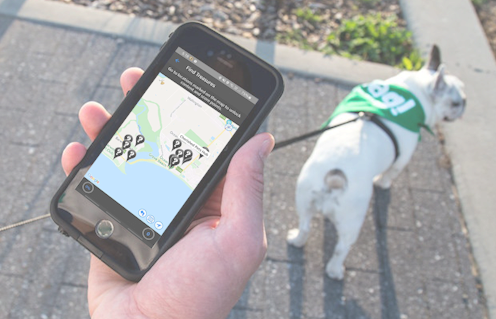How we can use gaming to support positive ageing (and support our relationships with our pets, too)
- Written by Larissa Hjorth, Professor of Mobile Media and Games., RMIT University

Margaret, 63, loves playing online Scrabble everyday with her sister who lives interstate. The online game allows a playful way to keep in constant contact when geographically distant.
Tom, 70, discovered the joy of Wordle and sharing his daily outcomes with friends. Penelope, 67, gets online to play Roblox games with her grandchildren who are living interstate.
These are just a few examples of the many ways older adults are gaming across Australia.
During the pandemic lockdowns, games were not only spaces for everyday creativity and informal literacy, but a way to socialise and keep fit – both mentally and physically. So much so that, in 2020, the World Health Organisation acknowledged[1] the communicative and social power of games for wellbeing.
Even though the typical gamer[2] is middle-aged woman, ageist stereotypes about gamers continue to circulate, reflecting broader inherent ageisms embedded within Australian culture.
Maybe we could turn this problem on its head. Perhaps we could use games to empower ageing and ageing well, creating bridges[3] between the generations – and even improve our relationships with animals while we’re at it.
Read more: Codecracking, community and competition: why the word puzzle Wordle has become a new online obsession[4]
Ageing well
Older adults are one of the most divergent cohort of technology users, from “silver surfer[5]” innovators to those who have little experience or confidence.
Victoria’s Ageing Well Report[6] lists eight attributes to ageing well: positivity, purpose, respect, socially connection, keeping up in a changing world, financial/personal security, health autonomy and mobility.
Many of these attributes can be addressed through games and play.
In our study into mobile game practices in Australian homes, we found numerous ways[7] in which games offer intergenerational ways for socialising, connection and creativity.
Word games like Scrabble and Wordle have been deployed to add playful, social dimensions to people’s lives: older adult siblings playing online everyday, or grandparents playing with grandchildren interstate.
Game apps like Pokémon Go have been used to motivate older adults to exercise and socialise.
In countries as varied as Japan and Spain, the power of Pokémon Go has enhanced various dimensions of everyday life – from getting mobile and discovering local neighbourhoods to playing together cooperatively to win tournaments.
Read more: Meet Sofia: a 67-year-old widow who uses Pokémon Go to reconnect with her city[8]
Game genres such as “social justice” and “games for change” have been deployed to address complex issues such as elder abuse in new ways[9] by providing safe spaces to enhance empathy and reshape perceptions.
In our research[10], we accompanied and interviewed older adult players in Badalona, Spain about their use of Pokémon Go.
On the streets of Badalona, chasing Pokémons was clearly about intergenerational play and sociality. The game was such a success in older adult rehabilitation by making exercise fun and social that social workers started to prescribe it as part of their health plans.
There is a growing body of research[11] into games for intergenerational connection. But the role of games to enhance our relationships with animals has been overlooked – despite the fact animals play an essential role in our contemporary relationships.
Our best friend
Australians love their animals: one in three prefer[12] animals to humans.
Despite this reality, animal companions are not acknowledged[13] in Australia’s aged care plans. This means many older adults can be disenfranchised[14] by the system.
For many older adults, animal companions are crucial[15] to their social and physical wellbeing.
Digital games like Stray[16] see the player take on the role of a stray cat. These types of games can enhance our empathy for animals, but there is a missed opportunity in relation to the human-animal bonds for ageing well.
The human-animal kinship is a space ready for gameplay which could enrich the possibility of ageing well.
During the pandemic lockdowns, Melbourne’s Cherished Pet Foundation[17] trialled different techniques to support their community – including the use of games.
Pet Playing for Placemaking[18] (co-designed by Jacob Sheahan) invited older pet owners and local community members to partner up and compete in treasure-hunt style gameplay.
Older pet owners, limited in mobility and vulnerable to the virus, completed digital puzzles which reveal locations where their play partner (typically a volunteer or neighbour) can walk their pet and discover more challenges that lead to other places.
Participants reported they found the game a fun way to connect with their neighbourhood and their community – and it kept their pets happy, too.
Read more: Dogs can get dementia – but lots of walks may lower the risk[19]
The beauty of game play
Ageing well is about positive and empowering pathways for ageing across emotional, physical and mental domains.
This can take many forms: social connection, respectful relationships, regular exercise and mobility.
Games can play an active role in empowering ageing, enriching social and intergenerational connection, mobility and health.
While the pandemic has laid bare barriers to ageing well, it has also created opportunities. Maybe we all need to play more with ageing well?
References
- ^ acknowledged (www.usatoday.com)
- ^ typical gamer (techjury.net)
- ^ creating bridges (blogs.lse.ac.uk)
- ^ Codecracking, community and competition: why the word puzzle Wordle has become a new online obsession (theconversation.com)
- ^ silver surfer (nationalseniors.com.au)
- ^ Ageing Well Report (www.seniorsonline.vic.gov.au)
- ^ numerous ways (mitpress.mit.edu)
- ^ Meet Sofia: a 67-year-old widow who uses Pokémon Go to reconnect with her city (theconversation.com)
- ^ in new ways (link.springer.com)
- ^ our research (psycnet.apa.org)
- ^ growing body of research (www.researchgate.net)
- ^ one in three prefer (www.abc.net.au)
- ^ not acknowledged (issuu.com)
- ^ disenfranchised (mh.bmj.com)
- ^ are crucial (academic.oup.com)
- ^ Stray (en.wikipedia.org)
- ^ Cherished Pet Foundation (www.cherishedpetcare.com.au)
- ^ Pet Playing for Placemaking (dcp-ecp.com)
- ^ Dogs can get dementia – but lots of walks may lower the risk (theconversation.com)

















